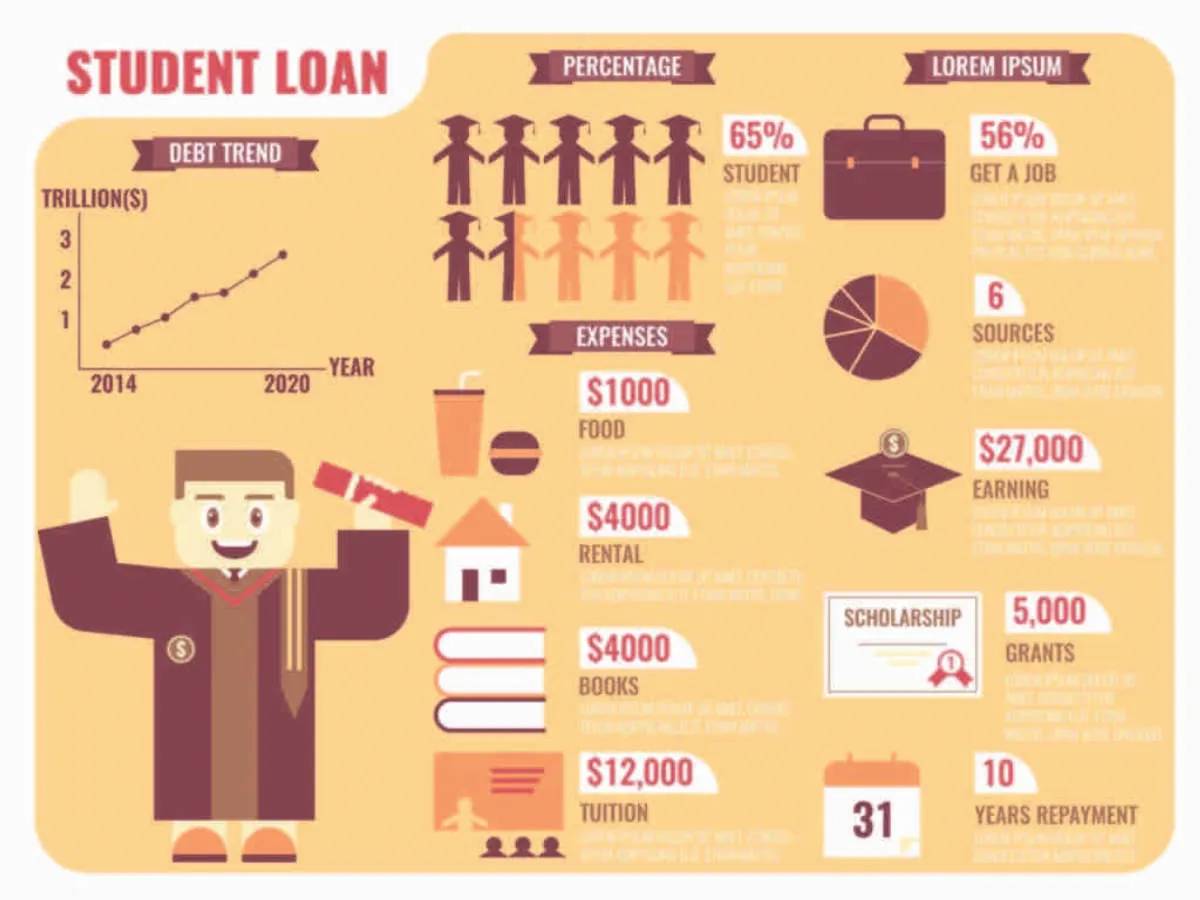Managing student loans can be challenging, but with the right financial tips, you can navigate the repayment process more effectively. Learn how to create a sustainable plan and make informed decisions to tackle your student loan debt.
Understanding Your Student Loans

Before you can effectively manage your student loans, it’s crucial to understand what you’re dealing with. This means taking a deep dive into the specifics of your loans:
1. Identify Your Loan Types:
Did you borrow federal loans or private loans?
- Federal Loans: These come with benefits like income-driven repayment plans, forgiveness programs, and more flexible deferment options.
- Private Loans: Offered by banks and credit unions, these loans generally have less flexible terms and may have higher interest rates.
2. Know Your Loan Servicer:
Your loan servicer manages the billing and other administrative tasks associated with your loans. You’ll make your payments to them. Be sure to keep their contact information current.
3. Interest Rates:
Understand the interest rate on each of your loans. Are they fixed (stay the same) or variable (can change over time)? Higher interest rates mean you’ll pay more over the life of the loan.
4. Loan Terms:
What is the total amount you owe? What is the length of your repayment term (e.g., 10 years, 25 years)? A longer term means lower monthly payments but more paid in interest overall.
5. Review Your Credit Report:
Your credit report will list all your student loans, providing a comprehensive picture of your debt. You can obtain a free credit report annually from each of the three major credit bureaus.
Creating a Repayment Plan

Once you’ve assessed your financial situation and explored repayment options, it’s crucial to establish a solid repayment plan. This plan will serve as your roadmap to becoming debt-free while effectively managing your finances.
1. Choose a Repayment Plan That Aligns with Your Goals:
Consider your short-term and long-term financial goals. Do you prioritize lower monthly payments or paying off your loans faster? Evaluate different repayment plans, such as:
- Standard Repayment: Fixed monthly payments over a set period, typically 10 years.
- Graduated Repayment: Payments start lower and gradually increase over time, often every two years.
- Extended Repayment: Extends the repayment term, resulting in lower monthly payments but potentially higher overall interest costs.
- Income-Driven Repayment: Monthly payments are based on a percentage of your discretionary income, offering affordability but potentially extending the repayment period.
2. Explore Loan Consolidation or Refinancing:
If you have multiple loans, consider loan consolidation or refinancing to potentially simplify repayment and secure a lower interest rate. Loan consolidation combines multiple loans into one new loan, while refinancing replaces your existing loan with a new one from a different lender.
3. Automate Payments:
Set up automatic payments to ensure timely payments and avoid late fees. Many loan servicers offer discounts for enrolling in autopay.
4. Make Extra Payments When Possible:
Whenever your budget allows, make additional payments towards your principal balance. Even small extra payments can significantly reduce the overall interest you pay and shorten your repayment term.
5. Regularly Review and Adjust Your Plan:
Life changes, such as a salary increase or unexpected expenses, can impact your repayment plan. Regularly review your budget and make necessary adjustments to ensure your plan remains manageable and aligns with your financial goals.
Choosing the Right Repayment Option

Navigating student loan repayment can feel overwhelming, but finding the right repayment plan for your circumstances is crucial. With various options available, understanding your choices can make a significant difference in your financial well-being. Here’s what you need to consider:
1. Standard vs. Income-Driven Repayment Plans
Standard Repayment Plans offer a fixed monthly payment over a set period, typically 10 years. This option results in the least amount of interest paid overall but may lead to higher monthly payments.
Income-Driven Repayment (IDR) Plans base your monthly payment on your income and family size. These plans can make loan payments more manageable, especially if you’re starting your career with a lower income. However, be aware that you might end up paying more interest over time.
2. Exploring Income-Driven Repayment Options
If you choose an IDR plan, several options exist, each with different eligibility criteria and terms:
- Income-Based Repayment (IBR)
- Pay As You Earn (PAYE)
- Revised Pay As You Earn (REPAYE)
- Income-Contingent Repayment (ICR)
Research each plan carefully or consult with a financial advisor to determine which IDR plan best aligns with your income, family size, and long-term financial goals.
3. Loan Forgiveness Programs
Depending on your profession and whether you work in a public service field, you might qualify for loan forgiveness programs. These programs can significantly reduce or eliminate your student loan debt after a certain period of qualifying payments.
4. Refinancing and Consolidation
Refinancing your student loans with a private lender might get you a lower interest rate, potentially saving money over the life of the loan. However, refinancing federal loans means losing access to federal protections and repayment options.
Consolidation combines multiple federal loans into one, simplifying repayment. While consolidation doesn’t typically lower interest rates, it can make managing multiple loans easier.
5. Reviewing and Adjusting Your Plan
Life circumstances change, and your repayment plan should adapt with you. Don’t hesitate to contact your loan servicer to explore different repayment options, adjust your income-driven repayment plan, or discuss deferment or forbearance options if you experience financial hardship.
Consolidating Your Loans

Loan consolidation can be a helpful tool in managing multiple student loans. It allows you to combine multiple federal loans into a single, new loan with a fixed interest rate. This can simplify repayment by having one monthly payment instead of several, and potentially lower your monthly payment by extending your repayment term.
Benefits of Consolidation:
- Simplified repayment with one monthly payment.
- Potential for a lower monthly payment.
- Fixed interest rate based on the weighted average of your current loans.
Things to Consider:
- Extending your repayment term may result in paying more interest over the life of the loan.
- You may lose certain benefits associated with individual loans, such as interest rate discounts or loan forgiveness programs.
- Consolidating private loans with federal loans means losing out on federal loan benefits and protections.
Before consolidating, carefully consider:
- The types of loans you have.
- Your current interest rates.
- Your eligibility for loan forgiveness programs.
Finding Loan Forgiveness Programs

Loan forgiveness programs can be a lifeline for graduates struggling with student debt. These programs, offered by the government and some private organizations, forgive a portion or all of your loans if you meet specific eligibility criteria.
Start by exploring these avenues:
- Federal Loan Forgiveness: The U.S. government offers programs like Public Service Loan Forgiveness (PSLF) for those employed in public service roles. Income-Driven Repayment (IDR) plans can also lead to forgiveness after a set repayment period.
- State-Specific Programs: Many states have their own loan forgiveness initiatives, often targeting specific professions like teachers, nurses, or legal aid attorneys. Research programs within your state of residence and licensure.
- Employer-Sponsored Assistance: Inquire with your HR department about potential employer contributions towards loan repayment or if they participate in any loan assistance programs.
- Non-Profit Organizations: Some non-profits offer loan forgiveness as an employee benefit. Explore opportunities that align with your career goals and values.
When researching programs, pay close attention to:
- Eligibility requirements (employment, loan type, etc.)
- Application procedures and deadlines
- Required documentation and verification processes
- Potential tax implications of loan forgiveness
Keep in mind that loan forgiveness programs often have strict guidelines. Thoroughly review the terms and conditions to determine your eligibility and maximize your chances of approval.
Managing Your Budget

Effective student loan management often hinges on a well-structured budget. Creating a realistic budget allows you to track your income and expenses, identify areas for potential savings, and ensure timely loan payments.
Creating a Budget that Works
Start by listing your sources of income, including part-time jobs, scholarships, and financial aid. Then, track all your expenses, categorizing them as needs (rent, groceries, utilities) and wants (dining out, entertainment). Prioritize essential expenses and explore areas where you can cut back on discretionary spending.
Tips for Sticking to Your Budget
- Utilize budgeting apps: Numerous apps can help you track expenses, set financial goals, and receive personalized insights.
- Consider meal prepping: Cooking at home is often significantly cheaper than eating out, saving you money in the long run.
- Explore student discounts: Many businesses offer discounts for students on various products and services.
- Review your budget regularly: Ensure your budget remains relevant to your current financial situation and make adjustments as needed.
Building an Emergency Fund

While you’re focused on paying down student loans, it’s equally crucial to prioritize building an emergency fund. Unexpected expenses, such as medical bills or car repairs, can derail your budget and potentially lead to increased debt. Having an emergency fund provides a financial cushion and helps you avoid taking on additional debt or falling behind on your loan payments.
How much should you save? Aim for 3-6 months’ worth of living expenses. This may seem daunting, but remember, every little bit helps. Start by setting a realistic savings goal, such as $50 or $100 per month, and gradually increase it as your budget allows.
Where should you keep your emergency fund? A high-yield savings account is a good option, as it offers easy access to your funds and earns interest over time.
Using Financial Tools

Managing student loans can feel overwhelming, but various financial tools can help you stay organized and in control. These tools can simplify repayment, help you explore different repayment options, and potentially save you money:
1. Loan Servicer Websites and Apps:
Your loan servicer’s website and app are your go-to resources for managing your loans. You can use them to:
- Make payments
- Set up automatic payments
- View your loan balance and interest rates
- Enroll in different repayment plans
- Apply for deferment or forbearance if needed
2. Budgeting Apps:
Budgeting apps like Mint, YNAB (You Need a Budget), or Personal Capital can help you track your income and expenses, making it easier to allocate funds for your loan payments and avoid missed deadlines.
3. Loan Repayment Calculators:
Many online calculators can help you estimate your monthly payments, total interest paid, and potential savings from different repayment options like income-driven plans or refinancing.
4. Credit Monitoring Services:
Keeping an eye on your credit score is essential when managing loans. Services like Credit Karma or Experian offer free credit monitoring and alerts, notifying you of any changes that might affect your financial health.
5. Financial Counseling Services:
If you’re struggling to manage your student loans, consider seeking guidance from a non-profit credit counseling agency. They can offer free or low-cost advice on budgeting, debt management, and exploring different repayment options.
Reviewing and Adjusting Your Plan

Life is constantly changing, and your financial situation is no different. It’s crucial to periodically review your student loan repayment plan and make adjustments as needed. Here are some factors to consider:
Changes in Income and Expenses
Have you received a raise or started a new job with a higher salary? This is a great opportunity to consider increasing your monthly payments to pay off your loans faster and save on interest charges. Conversely, if you’ve experienced a decrease in income or an increase in living expenses, exploring options like income-driven repayment plans or deferment might be necessary.
Interest Rate Changes
Interest rates fluctuate, so keep an eye on how changes might affect your loans, especially if you have variable interest rates. Refinancing could be an option to secure a lower interest rate and reduce your overall debt burden.
Forgiveness and Repayment Options
Stay informed about loan forgiveness programs or repayment assistance plans you might be eligible for. Programs for teachers, public service workers, or those in specific professions can significantly impact your repayment journey. Don’t miss out on potential savings or even loan forgiveness by not staying updated.
Financial Goals
As you progress through life, your financial goals will likely evolve. Buying a home, starting a family, or investing in your future might become priorities. Revisit your student loan repayment plan to ensure it aligns with your current goals and doesn’t hinder your ability to achieve them.
Regular Check-Ups
Set calendar reminders to review your loan statements, repayment progress, and any new information or options available. Consider this a financial self-care routine to ensure you’re on track and making the most informed decisions regarding your student loan debt.
Seeking Professional Advice

Navigating the world of student loans can be complex and overwhelming. While online resources and general advice can be helpful, seeking personalized guidance from a financial advisor who specializes in student loans can make a significant difference in your financial well-being.
Benefits of Consulting a Professional:
- Personalized Loan Repayment Strategy: A financial advisor can analyze your specific financial situation, including your income, expenses, and loan terms, to develop a tailored repayment plan that aligns with your goals.
- Exploration of Repayment Options: They can guide you through various repayment options, such as income-driven repayment plans, graduated repayment plans, or loan consolidation, helping you choose the most suitable option.
- Loan Forgiveness and Repayment Assistance Programs: Financial advisors can determine your eligibility for loan forgiveness programs, such as Public Service Loan Forgiveness (PSLF), or identify potential repayment assistance programs that can alleviate your financial burden.
- Strategies for Loan Consolidation or Refinancing: They can assess whether consolidating or refinancing your loans is beneficial and guide you through the process, potentially helping you secure lower interest rates or simplified repayment terms.
- Financial Planning Beyond Loans: A financial advisor can provide holistic financial guidance, helping you create a budget, manage debt effectively, and plan for future financial goals, ensuring your student loans don’t hinder your overall financial well-being.
Finding a Qualified Advisor:
Look for advisors with certifications such as Certified Financial Planner (CFP) or Chartered Financial Analyst (CFA). Seek recommendations from trusted sources, compare fees and services, and ensure the advisor has experience specifically in student loan management.
Conclusion
In conclusion, adopting smart financial habits and exploring available repayment options are crucial in effectively managing student loans and securing a stable financial future.

